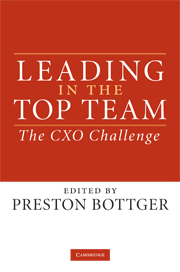Book contents
- Frontmatter
- Contents
- Figures
- Tables
- Contributors
- Editor's Acknowledgments
- 1 Introduction – Leading within and across the functions
- Section I The Business Imperatives
- Section II The CXOs: Within the Functions
- 5 The Chief Marketing Officer – Creating, delivering and communicating value to customers
- 6 The Chief Sales Officer – Sell, sell, sell!
- 7 The Chief Supply Chain Officer – Designing and managing lean and agile supply chains
- 8 The Chief Manufacturing Officer – Process execution, improvement and design
- 9 The Chief Financial Officer – A capital position
- 10 The Chief Technology Officer – Corporate navigator, agent of change and entrepreneur
- 11 The Chief Information Officer – Achieving credibility, relevance and business impact
- 12 The Chief Human Resources Officer – Delivering people who can deliver
- 13 The Corporate Governance Officer – From company secretary to manager of governance processes
- 14 The Chief Communications Officer – Leading strategic communications
- 15 The SBU President – Perhaps the best job for the CEO-in-training
- 16 CXOs and the Line – Serving the internal customer
- Section III The CEO and the Leadership Team – Pulling it all together
- Conclusion
- Index
- References
9 - The Chief Financial Officer – A capital position
Published online by Cambridge University Press: 19 August 2009
- Frontmatter
- Contents
- Figures
- Tables
- Contributors
- Editor's Acknowledgments
- 1 Introduction – Leading within and across the functions
- Section I The Business Imperatives
- Section II The CXOs: Within the Functions
- 5 The Chief Marketing Officer – Creating, delivering and communicating value to customers
- 6 The Chief Sales Officer – Sell, sell, sell!
- 7 The Chief Supply Chain Officer – Designing and managing lean and agile supply chains
- 8 The Chief Manufacturing Officer – Process execution, improvement and design
- 9 The Chief Financial Officer – A capital position
- 10 The Chief Technology Officer – Corporate navigator, agent of change and entrepreneur
- 11 The Chief Information Officer – Achieving credibility, relevance and business impact
- 12 The Chief Human Resources Officer – Delivering people who can deliver
- 13 The Corporate Governance Officer – From company secretary to manager of governance processes
- 14 The Chief Communications Officer – Leading strategic communications
- 15 The SBU President – Perhaps the best job for the CEO-in-training
- 16 CXOs and the Line – Serving the internal customer
- Section III The CEO and the Leadership Team – Pulling it all together
- Conclusion
- Index
- References
Summary
The central importance of the CFO derives from two main roles. Firstly, ensuring that the company has sufficient funds to implement its investment and growth strategies, and secondly, promoting the most efficient use of those funds. Shareholders expect the CFO to ‘keep the house in order’. This means the CFO needs the confidence of the investment community as well as employees. Professionalism, leadership skills and integrity are essential.
In this chapter, the author explains how the finance function has evolved. He explores the purpose of the CFO – to enable the optimal use of capital to maximize shareholder value – and describes how the CFO role is developing and the skills needed to succeed.
The role of the chief financial officer
Any successful CFO has to be a damn good businessman who also knows how to count.
As CFOs, we have an obligation to respond to [external pressures] with sound advice for our fellow business leaders. We are responsible for creating concrete measures to protect and maintain good, balanced corporate governance – not just compliance. We have an obligation to demonstrate integrity and sound business principles.
A company's destiny is so closely linked to its financial performance that the CFO is an influential member of the executive team. The CFO can be particularly powerful in companies that are under-performing and in industries with high financial risk.
- Type
- Chapter
- Information
- Leading in the Top TeamThe CXO Challenge, pp. 161 - 181Publisher: Cambridge University PressPrint publication year: 2008



